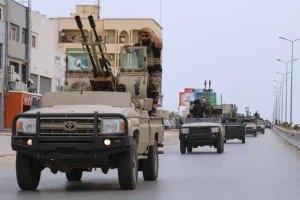Dan Jones: Building crisis resilience beyond evacuation in Libya

When trouble flares in Libya, you can almost set your watch by the convoys of white SUVs pulling out of compounds, the frantic phone calls to charter airlines, and the evacuation Standard Operating Procedures being dusted off from the last crisis. To many foreign companies, evacuation has become the default “strategy.”
When things get hot, get out.
It’s understandable. Libya is not the easiest environment to operate in. But here’s the uncomfortable truth: evacuation is not a business plan. It’s a retreat. A temporary fix that carries enormous financial, reputational, and operational costs. For companies serious about staying in Libya and there are plenty who see real opportunity here, the real answer lies in building crisis resilience.
Libya’s Operating Reality
Libya has lived with volatility for over a decade. Governments change, militias rise and fall, alliances are built and broken. One day, a minister is shaking hands with foreign investors; the next, his office is blockaded by armed men demanding unpaid salaries.
The operating environment is shaped as much by Facebook posts as by formal policy. A rumour online can spark street protests by the afternoon. Armed groups add to the uncertainty, whether through sudden clashes, surprise checkpoints, or road closures that appear without warning. Terrorist attacks may not hit the headlines every week, but when they do occur, they cut straight through any illusion of stability and remind companies how fragile the environment remains. Meanwhile, infrastructure continues to groan under the weight of years of conflict and neglect, with electricity blackouts, fuel shortages, and broken communications now part of daily life.

For businesses, this means disruption is constant. But disruption is not the same as impossibility. Libya remains one of the most resource-rich countries in North Africa, along with huge demand for foreign expertise in energy, construction, telecoms, and services. The question is not whether opportunity exists; it’s whether companies are equipped to withstand the bumps on the road.
The Evacuation Trap
Too often, companies fall into the evacuation trap. When tensions rise, the instinct is to pull people out, suspend operations, and “wait for things to calm down.” On paper, this looks sensible. In reality, it is ruinously expensive and often counter-productive.
The hidden costs of evacuation are severe. Charter flights and last-minute logistics drain budgets. Business continuity collapses, contracts are lost, and local staff are left stranded or resentful. Reputation suffers, both with Libyan partners who see a foreign firm walking away when things get difficult, and with competitors who seize the chance to fill the vacuum.
Even worse, re-entry is hard. Once a company leaves, rebuilding trust, re-establishing supply lines, and recovering market share takes months or years. In Libya’s fast-moving environment, an absence of even a few weeks can see opportunities handed to rivals.
Evacuation should always remain a last-resort contingency, not the first line of defence. The real advantage belongs to those who can stay when others cannot.
What Crisis Resilience Really Means
Crisis resilience is not about ignoring risk or pretending the situation is stable. It is about creating the capacity to absorb shocks and continue operating. In Libya, that means having a plan that goes beyond fences, guards, and fire drills.
True resilience combines several layers:
- Continuity planning that ensures critical operations can run even when offices close or staff relocate.
- Supply chain resilience, with clear knowledge of which routes, ports, and border crossings are viable and which are vulnerable to disruption.
- Reliable intelligence, both real-time and forward-looking, to cut through rumour and identify real threats.
- Stakeholder mapping, to understand which local actors influence your sector and how to maintain relationships under pressure.
- Companies with these elements in place are not immune to Libya’s volatility. But they can bend without breaking. They can weather protests, power cuts, or political disputes without pulling out their people and shuttering their operations.
Nexus as the Game-Changer
This is where new tools are shifting the balance. Raedan’s Nexus platform was designed for exactly these environments, where information is fragmented, risks are fluid, and decisions need to be made fast.
Nexus tracks incidents in real time across Libya, drawing from a blend of local sources, open-source monitoring, and structured intelligence feeds. It doesn’t just report events; it maps them. Users can see how a protest in Misrata might ripple into fuel shortages in Tripoli, or how clashes in the south could impact cross-border routes.
Crisis resilience is not about ignoring risk or pretending the situation is stable. It is about creating the capacity to absorb shocks and continue operating.
More importantly, Nexus is not just reactive. It provides forward-looking analysis, scenario forecasting, and political risk assessments tailored to operational needs. Companies can model the impact of rival militias vying for control of a district or anticipate how government reshuffles could affect contract approvals.
One international client used Nexus to anticipate the disruptions caused by protests which closed down Misrata Free Zone Port in July this year. While competitors scrambled to reroute shipments after protests broke out, this company had already shifted logistics to alternative entry points, saving both time and money. The difference was not luck, it was foresight.
This kind of capability transforms crisis management from firefighting into genuine resilience. Evacuations become less likely because companies see the storm before it breaks. And even when evacuations are necessary, they are executed calmly, with proper preparation, not as last-minute panics.
Lessons for Companies in Libya
There are some clear lessons for firms operating in Libya today.

First, have an evacuation plan; but don’t confuse it with strategy. Evacuations save lives, but they destroy continuity if they are the only plan on the shelf.
Second, crisis management begins with intelligence, not reaction. The ability to distinguish between noise and signal is everything. A rumour on social media is not the same as a verified militia mobilisation. Without reliable intelligence, companies either over-react or under-react. Both are equally costly.
Third, partnerships matter. Local actors, whether tribal leaders, municipal officials, or civil society groups, often shape access and stability more than national politics. Building trust here, guided by accurate mapping of relationships and influence, pays off when crises hit.
Finally, resilience is a competitive advantage. In Libya, disruptions are not a bug in the system; they are the system. Companies that can stay in operation when others withdraw are the ones that win contracts, retain market share, and gain the trust of Libyan partners.
The Path Forward
In Libya, evacuations will always remain part of the safety net. No responsible company should operate without them. But confusing evacuation with resilience is a costly mistake. Evacuation is a retreat; resilience is a strategy.
The companies that succeed in Libya are not those who can leave the fastest. They are the ones who can stay the smartest, who invest in foresight, continuity, and trusted intelligence.
READ: Lorenzo Maria Pacini: The Sahel’s struggle for a free Africa
At Raedan, we’ve seen it time and again: the difference between success and failure in Libya is not luck, not muscle, and not firepower. It’s preparation. It’s the ability to see around corners.
Evacuations may get you out of Libya. Resilience keeps you in the game.
The views expressed in this article belong to the author and do not necessarily reflect the editorial policy of Maghrebi.org. Dan Jones is an intelligence specialist with over 25 years of experience, including the last 10 operating in Libya. He is the co-founder of Raedan Group, a UK-based private intelligence firm helping clients stay three steps ahead in some of the world’s most high risk environments.
If you wish to pitch an opinion piece please send your article to grace.sharp@maghrebi.org
Want to chase the pulse of North Africa?
Subscribe to receive our FREE weekly PDF magazine













